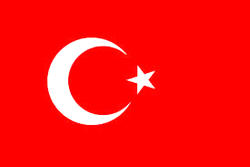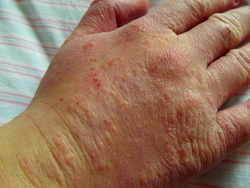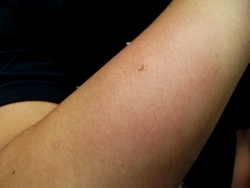
Acupuncture is an effective adjunctive therapy for chronic urticaria patients receiving omalizumab, and can improve quality of life and disease control, concludes a research team in the Faculty of Medicine at Balikesir University, Turkey.
A total of 61 patients, diagnosed by a dermatologist with chronic urticaria, were divided into two groups: 31 received acupuncture in addition to omalizumab, whilst a control group received omalizumab only. Disease activity and quality of life were assessed before and after treatment using specialist urticaria questionnaires. Omalizumab was given by subcutaneous injection of 300mg every 4 weeks. Acupuncture was given once a week for 8 weeks, as a 40 minute treatment using body points followed by the application of semi-permanent ear needles which were left in place between sessions.
Itching, wheals, eye swelling, lip swelling, work, physical activities, sleep, free time, social relationships, eating, falling asleep, waking up at night, tiredness, concentration, nervousness, bad mood, embarrassment in public, restrictions on clothing choices, and medication adverse effects were all significantly lower after acupuncture compared with before.
The team concludes that acupuncture therapy be a beneficial adjunctive treatment for patients with chronic urticaria receiving omalizumab therapy. There were significant improvements in both quality of life and disease control scores in the combined therapy group compared to both the control and pre-acupuncture groups. While the study has limitations, including a relatively small sample size and short follow-up, the improvements highlight the potential value of acupuncture. Further research with larger patient populations and longer-term follow-up is warranted to confirm these findings and establish the role of acupuncture as a standard treatment option.
(Acupuncture Enhances Quality of Life and Disease Control in Chronic Spontaneous Urticaria Patients on Omalizumab: A Study of 61 Cases. Medical Science Monitor, 15 October 2024.)

 Researchers at the Charité–Universitätsmedizin Berlin, one of Europe’s largest university hospitals, have shown that acupuncture helps itching in eczema (atopic dermatitis), and may help patients reduce their use of steroid creams. A total of 121 patients, recruited through media advertising in Berlin, were randomised to receive acupuncture, osteopathy or no treatment as a control. All received standard routine care consisting of topical steroids and emollients. Acupuncture comprised eight treatments at one to two week intervals.
Researchers at the Charité–Universitätsmedizin Berlin, one of Europe’s largest university hospitals, have shown that acupuncture helps itching in eczema (atopic dermatitis), and may help patients reduce their use of steroid creams. A total of 121 patients, recruited through media advertising in Berlin, were randomised to receive acupuncture, osteopathy or no treatment as a control. All received standard routine care consisting of topical steroids and emollients. Acupuncture comprised eight treatments at one to two week intervals.  American authors have surveyed complementary treatments including acupuncture for psoriasis. They studied 44 randomised controlled trials, 13 uncontrolled trials and 3 meta-analyses. One meta-analysis of 13 randomised controlled trials examined the association of acupuncture with improvement in psoriasis, and showed significant improvement with acupuncture compared with placebo.
American authors have surveyed complementary treatments including acupuncture for psoriasis. They studied 44 randomised controlled trials, 13 uncontrolled trials and 3 meta-analyses. One meta-analysis of 13 randomised controlled trials examined the association of acupuncture with improvement in psoriasis, and showed significant improvement with acupuncture compared with placebo.